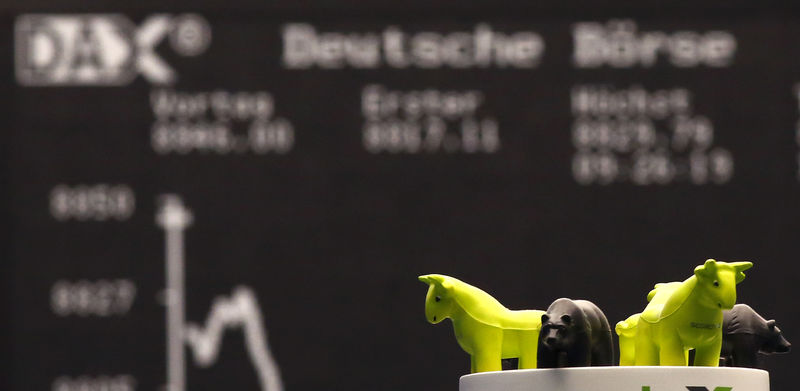This post was originally published on this site
https://i-invdn-com.investing.com/news/LYNXNPEEAC0LE_M.jpg
At 03:15 ET (08:15 GMT), the DAX index in Germany traded 0.2% lower, the CAC 40 in France traded down 0.3% and the FTSE 100 in the U.K. dropped 0.1%.
The new week has started on a negative note, handing back some of the previous week’s gains as investors consolidate in thin trading with U.S. investors likely to be missing given the Presidents’ Day holiday.
The economic data slate is also largely empty Monday, with only new car registration data for January from most European countries due later in the session.
Of more interest will be the release of flash PMIs important later in the week, along with business and consumer sentiment surveys, which should provide clues of the state of the region’s economies, with investors looking for the European Central Bank to start cutting interest rates this year to assist the recovery.
There are also plenty of ECB speakers out and about this week, including President Christine Lagarde at a Eurogroup press conference on Friday.
China’s central bank left a key policy rate unchanged as expected on Sunday, with uncertainties around the timing of an easing by the Federal Reserve limiting Beijing’s room to manoeuvre on monetary policy.
The U.S. central bank kept interest rates unchanged earlier this month, but sticky inflation has meant that investors are now pushing back the start of the Fed monetary easing to at least the middle of the year from March.
Banco Santander (BME:SAN) stock rose 0.8% after the Spanish banking giant, the eurozone’s second-biggest lender, announced a new share buyback program of €1.46 billion (€1 = $1.0785).
Corporate earnings continue this week, with attention on the U.S. retail sector as well as numbers from chipmaker Nvidia (NASDAQ:NVDA) after the U.S. market close on Wednesday.
Nvidia results could be a pivotal test of market sentiment given the size of the company and its place at the center of excitement over the financial promise of AI.
Oil prices fell Monday, retreating after recent gains, after sticky U.S. inflation caused attention to return to concerns over the demand outlook in the world’s biggest oil consumer.
By 03:15 ET, the U.S. crude futures traded 0.7% lower at $77.88 a barrel, while the Brent contract dropped 0.8% to $82.82 a barrel.
Stronger-than-expected U.S. consumer and producer inflation data released last week ramped up concerns that the Federal Reserve will have little impetus to cut interest rates early in 2024, potentially stifling economic activity for longer than had been expected.
Both crude benchmark contracts had settled higher on Friday on the back of raised geopolitical tensions in the Middle East, increasing worries of supply issues in this oil-rich region.
Additionally, gold futures rose 0.4% to $2,032.40/oz, while EUR/USD traded 0.1% higher at 1.0786.

